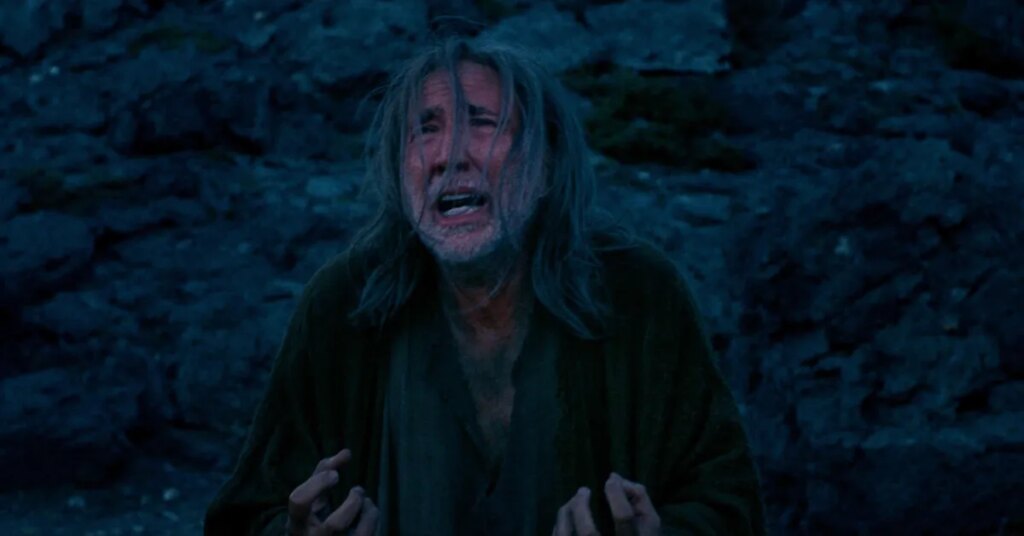Making a horror movie about Jesus Christ was never going to be easy, though Lofty Nathan, the writer and director of The Carpenter’s Son, isn’t so sure his movie is truly a horror film. “I think the label is a bit tricky,” he says. “But it does tow the line.”
The Carpenter’s Son, now in theaters, has a straightforward premise. It follows Jesus (Noah Jupe) at 15 as he begins to discover his healing abilities. Temptation arrives in the form of a mysterious stranger (Isla Johnston), who tries to sow doubt about the identity of Jesus’ real parentage, as a conflict grows between the son and his carpenter father Joseph.
[time-brightcove not-tgx=”true”]
Though the film is about Jesus, Mary (FKA twigs), and Joseph (Nicholas Cage), it never refers to them by name, instead calling them the son, the mother, and the carpenter, respectively. “That wasn’t to be coy or anything,” says Nathan. “I think it’s pretty obvious who people are in the movie. It made sense to me in trying to tell a story of this kind of obscure origin in a narrower scope with some anonymity, when Jesus would have just been a carpenter’s son.”
It’s the latest movie depicting the life of Jesus to become the target of much controversy, much like Martin Scorsese’s The Last Temptation of Christ, Darren Aronofsky’s Noah, Kevin Smith’s Dogma, and Terry Jones’ Monty Python and the Life of Brian. That’s because The Carpenter’s Son is not only gruesomely horror-leaning, but it’s based on the Infancy Gospel of Thomas, which some deem heretical or even blasphemous. The book is apocryphal, a non-canonical text that deals with Jesus’ adolescence, something not found in the Bible.

Nathan’s father was the first to bring the book to his attention. “He showed me this old copy of the Infancy Gospel of Thomas he had, and it just dawned on me immediately that this would be very compelling as a film. It’s kind of a missing piece in the timeline of the New Testament. You’re in this origin story phase of Jesus’ life. That, to me, was really the pull. I wasn’t aware of the apocrypha at the time,” he says.
As Nathan researched, he was struck by how frightening a lot of what he read was. “A lot of the subject matter is pretty harrowing. A lot of the Bible is, in fact. That really inspired me to put a genre lean on it,” he says of The Carpenter’s Son. According to Nathan, the film could have been a great deal more controversial had he stuck closer to the Infancy Gospel. “It would be a lot more salacious,” he insists. “I think it presents a much more petulant and less redeemable story. I just took the essential idea of these lost years, and read between the lines in identifying a troubled dynamic between Joseph the carpenter and Jesus, and this parental feud. The inclusion of the stranger and where the story goes by the end, that’s all my invention.”
Nathan doesn’t consider himself particularly religious: “I’d say I fear God more than believe in God.” But he was raised a Coptic Orthodox Christian. “The Coptic Orthodox Museum in Cairo has an old manuscript of the apocrypha there, which really interested me. I’m really interested in this whole speculation of what’s outside the pages and what’s between the lines of the story of the Bible. As a young kid, you might ask those questions, and maybe you learn to stop asking those questions.”

On top of its source material, much of the controversy that surrounds The Carpenter’s Son comes from its depiction of a flawed Jesus. “Some sects, like Catholicism, believe Christ was divine and had no weaknesses, that his only real weakness was his body.” But the Jesus in Nathan’s movie is human and imperfect. He experiences feelings of doubt, frustration, and even anger as he tries to understand his own abilities and the world around him. “I find that the sacrifice Jesus made would be even more compelling if he also suffered doubt,” adds Nathan. The director also believes the fact that the film has been billed as a horror has had a big impact, as countless comments on social media have expressed repulsion at that choice. “The genre depiction is maybe a bit threatening,” Nathan concedes. But he maintains that horror is merely one tool used in the storytelling. “I couldn’t take on this story as a pure horror movie,” he says. “I’d have felt that it was irresponsible.
The Carpenter’s Son has been the subject of a review bombing campaign both on Google and IMDb, and the trailers have been flooded with angry comments calling it blasphemous and hateful, as well as demands that the movie be banned. Nathan also received his first death threat leading up to the movie’s release. “I find it kind of unfortunate that now you’ve got people in the U.S., of Christian faith, in 2025, who would react with such a fierce censorship mentality. That said, there’s that quote I’m a firm believer of: “‘I disapprove of what you say, but I will defend to the death your right to say it.’”
In the face of backlash, Nathan doesn’t regret making The Carpenter’s Son. “There are a lot of very sanitized and conventional approaches to Christianity and to religious films. I was trying to do something that a bit different, and that to me is exciting and worthwhile,” says Nathan.
Despite everything, Nathan believes people who actually end up seeing the film might see things very differently. “Fundamentally, there are sects of Christianity that don’t agree with the idea that Jesus could have been human in the ways that he’s presented in the film,” he says. “But it’s not as evil as people are assuming. It doesn’t go anywhere near where the Infancy Gospel goes.”
Says Nathan, “Ultimately, there’s a character who I hope people find relatable in some way.”
The post The Director of a Controversial Horror Movie About Jesus Insists It’s ‘Not as Evil as People Are Assuming’ appeared first on TIME.




